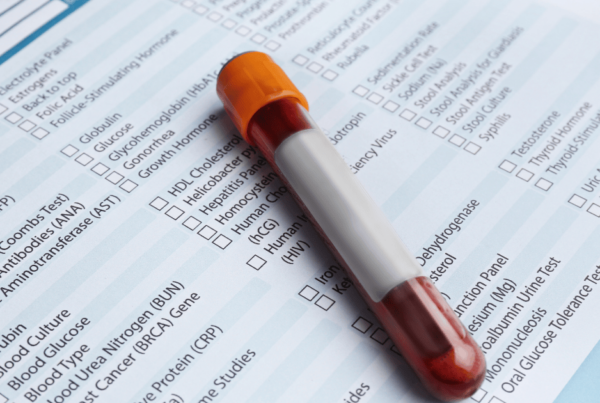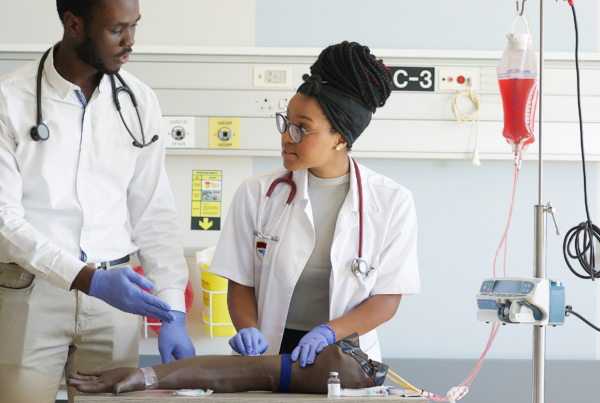The phlebotomist career path offers a dynamic and rewarding journey within the healthcare industry. Phlebotomists are essential healthcare professionals who help doctors diagnose patients and contribute to vital medical research by drawing blood samples. Phlebotomists are equipped with abilities such as good communication and hand-eye coordination to work in a variety of healthcare environments. This guide is designed for aspiring phlebotomists, current professionals looking to advance, and students considering a phlebotomy career. The tone is informative, professional, and supportive, catering to individuals seeking comprehensive knowledge about advancing their phlebotomist career path.
| Key Takeaways: Phlebotomist Career Path |
| Phlebotomists play a crucial role in healthcare by collecting blood samples for diagnostics and research. |
| Essential skills for phlebotomists include manual dexterity, interpersonal communication, and organization. |
| Specializations, managerial positions, switching to nursing, becoming a medical laboratory technician, or becoming a physician assistant are all options for career growth. |
| The demand for phlebotomists is expected to grow, offering job stability and opportunities for higher earnings. |
What is a Phlebotomist?
A phlebotomist is a healthcare professional trained in blood collection and processing. Phlebotomists collect blood samples for diagnostic testing, medical research, and donations. They typically work in hospitals, medical laboratories, private practices, and blood donation centers. Understanding the role and responsibilities of a phlebotomist is crucial for anyone considering this career path.
Responsibilities of a Phlebotomist
Phlebotomists ensure patients understand the blood collection process and help ease any apprehension. Their responsibilities include:
- Easing patient and donor apprehension about the procedure
- Finding a suitable vein for blood draw
- Cleaning the puncture site before and after drawing blood
- Collecting patient or donor identification information
- Correctly labeling blood samples
- Inputting patient or donor details into healthcare systems
- Sanitizing medical instruments and maintaining cleanliness in their workspace
Essential Skills for a Phlebotomist
To excel on the phlebotomist career path, one must develop several key skills:
- Manual Dexterity: Safe and precise handling of medical instruments to avoid injuries and ensure efficient blood collection.
- Interpersonal Communication: Building rapport with patients and donors, explaining procedures, and easing their anxiety.
- Organization: Managing multiple blood samples accurately and ensuring they are labeled and sent to the correct locations for processing.
Salary and Job Outlook
Phlebotomists earn an average salary of $41,810 per year, with variations based on experience, location, and employer. The U.S. Bureau of Labor Statistics projects an 8% increase in demand for phlebotomists from 2022 to 2032, driven by the need for hospital diagnostics and blood donor drives.
Advancing Your Phlebotomist Career Path
Specialize in Phlebotomy
Specializing in a particular area of phlebotomy can boost your earnings and professional qualifications. Some specializations include:
- Registered Phlebotomy Specialist: Focuses on advanced blood collection techniques.
- Collections Phlebotomy Specialist: Specializes in collecting blood for donation or research.
- Traveling Phlebotomist: Works in various locations, offering services to different healthcare facilities.
- Donor Phlebotomy Technician: Specializes in blood collection at donation centers.
Pursue Managerial Positions
With experience, phlebotomists can transition into supervisory roles. Becoming a phlebotomy supervisor often requires a bachelor’s degree and involves managing a team, creating work schedules, ensuring the accuracy of blood sample labels, and meeting collection and processing deadlines.
Transition to Nursing
Many phlebotomists use their experience as a stepping stone to a nursing career. Working as a phlebotomist provides valuable patient interaction experience and familiarity with medical procedures. To become a registered nurse (RN), you will need an associate or bachelor’s degree in nursing and must pass the NCLEX-RN exam. Your phlebotomy background can enhance your nursing credentials and job prospects.
Work as a Medical Laboratory Technician
Phlebotomists can also advance by becoming medical laboratory technicians. This role involves analyzing blood samples to determine diagnoses and blood viability for transfusions. It requires an associate degree and professional certification. Phlebotomy experience can be beneficial in both your job search and academic studies in this field.
Become a Physician Assistant
For those interested in practicing medicine, a career as a physician assistant (PA) is an excellent option. PAs have higher earning potential and require a master’s degree from an accredited program. Experience as a phlebotomist can fulfill healthcare experience requirements for PA school admissions. PAs observe patients, assist physicians in developing treatment plans, and perform various medical duties.
Conclusion
The phlebotomist career path offers numerous opportunities for advancement, higher earnings, and professional growth. Whether you choose to specialize, transition to nursing, become a medical laboratory technician, or pursue a role as a physician assistant, the skills and experience gained as a phlebotomist provide a solid foundation for your career. The demand for phlebotomists is growing, making it a stable and rewarding career choice.
For aspiring phlebotomists and current professionals, understanding the various paths for career advancement is essential. By focusing on developing key skills, pursuing further education, and gaining certifications, you can achieve a fulfilling and prosperous career in phlebotomy.
Final Thoughts
Exploring and advancing along the phlebotomist career path requires dedication, continuous learning, and a commitment to patient care. The healthcare industry values skilled phlebotomists, and with the right approach, you can navigate this career path successfully and achieve your professional goals.
FAQs about Phlebotomist Career Path
What are the educational requirements for becoming a phlebotomist?
To become a phlebotomist, you typically need to complete a phlebotomy training program, which is often available at community colleges, vocational schools, and online institutions. Certification is also required and can be obtained through various organizations such as the American Society for Clinical Pathology (ASCP) and the National Phlebotomy Association (NPA).
What is the average salary for a phlebotomist?
The average salary for a phlebotomist is approximately $41,810 per year. However, this can vary based on experience, location, and employer.
How can a phlebotomist advance their career?
Phlebotomists can advance their careers by specializing in areas like blood collection for donation or research, pursuing managerial roles, transitioning to nursing, becoming a medical laboratory technician, or pursuing a career as a physician assistant.
What skills are essential for a phlebotomist?
Essential skills for a phlebotomist include manual dexterity, interpersonal communication, and organization. These skills help ensure safe and efficient blood collection, ease patient anxiety, and maintain accurate records.
What is the job outlook for phlebotomists?
The job outlook for phlebotomists is very positive, with a projected 8% increase in demand from 2022 to 2032. This growth is driven by the need for diagnostic testing and blood donations.
What are some common specializations in phlebotomy?
Common specializations in phlebotomy include becoming a registered phlebotomy specialist, collections phlebotomy specialist, traveling phlebotomist, and donor phlebotomy technician. These specializations can enhance career prospects and earning potential.
Can phlebotomy experience help in other medical careers?
Yes, experience as a phlebotomist can be beneficial for transitioning into other medical careers, such as nursing, medical laboratory technician roles, and physician assistant positions. The skills and patient interaction experience gained in phlebotomy are valuable in these fields.
By following the guidance in this comprehensive guide, you can effectively navigate and advance along your phlebotomist career path, achieving professional growth and fulfilling your career aspirations in the healthcare industry.
Phlebotomy Now School: Launch a Rewarding Phlebotomy Career Today!
Contact us today to explore how we can turn your passion for healthcare into a fulfilling profession!







